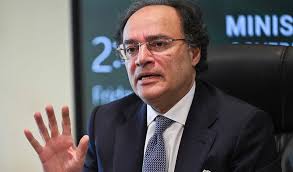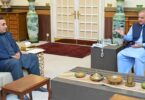F.P. Report
ISLAMABAD: Federal Minister for Finance and Revenue Muhammad Aurangzeb has expressed the hope that a new loan agreement with the International Monetary Fund (IMF) will be finalised next month and repayment of Chinese loans will only be possible after the commencement of the second phase of the China-Pakistan Economic Corridor (CPEC).
The finance minister expressed these views during a couple of interviews with media outlets in Washington where he has gone to attend the annual meetings of the IMF and the World Bank.
In an interview with British news agency Reuters, Aurangzeb said the government is seeking a longer loan to help bring permanence to macroeconomic stability as well as an umbrella under which the country can execute much-needed structural reforms.
The finance minister said they expect the IMF mission to be in Islamabad around the middle of next month. Once the IMF loan is agreed, Pakistan would also request additional financing from the Fund under the Resilience and Sustainability Trust, he added.
Aurangzeb said they have to come back into a certain ratings environment and the government is hoping to get an improvement in its sovereign rating in the next fiscal year.
He said Pakistan hopes to agree the contours of a new IMF loan in May and has kicked off talks with ratings agencies to lay the groundwork for a return to international debt markets.
Pakistan’s current $3 billion arrangement with the Fund runs out in late April and the government is seeking a longer and bigger loan to help bring permanence to macroeconomic stability as well as an umbrella under which the country can execute much-needed structural reforms, the minister said, adding “We expect the IMF mission to be in Islamabad around the middle of May – and that is when some of these contours will start developing.”
Aurangzeb met with the Fund’s Managing Director Kristalina Georgieva on Wednesday during the International Monetary Fund and World Bank Spring Meetings.
The minister declined to outline what size programme the government hoped to secure, though Pakistan is expected to seek, opens new tab at least $6 billion. Aurangzeb added that once the IMF loan was agreed, Pakistan would also request additional financing from the Fund under the Resilience and Sustainability Trust.
The struggling South Asian nation had managed to accumulate foreign exchange reserves in recent months and was on track for its war chest to hit $10 billion – or roughly two months import cover – by end-June.
The debt situation also looked more benign, Aurangzeb said and added “The bulk of our bilateral debt – including our China debt – is being rolled over, so in that sense I think we are in good shape and I don’t see a big issue during this fiscal year nor next fiscal year, cause we need to repay roughly $25 billion dollars every fiscal year.”
Pakistan also hopes to come back to international capital markets, possibly with a green bond. However, there was some more work to be done before that happens, said Aurangzeb. “We have to come back into a certain ratings environment,” he said, having kicked off talks with ratings agencies, adding the government was hoping to get an improvement in its sovereign rating in the next fiscal year.
“In all likelihood, any international capital markets issuance will likely be in the 2025/2026 fiscal year.”
Meeting with Chinese counterpart
Finance Minister Aurangzeb also held a meeting with his Chinese counterpart Lan Fo’an in Washington to discuss bilateral cooperation.
During the meeting, Aurangzeb conveyed heartfelt condolences on behalf of the Pakistani leadership and people due to the terrorist attack. Aurangzeb reaffirmed Pakistan’s commitment to ensure the safety and security of Chinese citizens in the country.
He stated that positive discussions are underway with financial institutions, including the IMF, for the economic stability of Pakistan.
The meeting signified the strong bond and commitment between the two countries, highlighting their shared vision for economic progress and cooperation.
Aurangzeb emphasized that Pakistan is taking steps towards reform agendas to strengthen its economy. The repayment of Chinese loans will only be possible after the commencement of the second phase of the China-Pakistan Economic Corridor (CPEC), he added.
He commended China for its invaluable contributions to Pakistan’s development as an “all-weather friend,” especially through initiatives such as the CPEC and support extended at international financial institutions.
Aurangzeb stated that Pakistan has been greatly affected by climate change, and China has always played a significant role in Pakistan’s development. CPEC is a remarkable and exemplary initiative by China, he added.
The minister highlighted that Phase I of CPEC focused on infrastructure development and Phase II would involve monetizing assets through the operationalization of Special Economic Zones and the relocation of Chinese Private-Owned Companies (POCs).
He expressed the government’s determination to expedite Phase II and appreciated the Chinese government for their support, including the SAFE deposits and regular rollovers to address external financing gaps.
He mentioned that the focus is on increasing the tax net and taking measures to reduce expenditures and lower the inflation rate. He provided an overview of the government’s priorities, which included broadening the tax base, addressing energy sector issues, and overhauling state-owned enterprises (SOEs).
Furthermore, Aurangzeb revealed Pakistan’s interest in tapping into the Chinese Bond Market, with plans to launch a Panda Bond during the fiscal year 2025-26.
Both sides agreed on the importance of continuing their cooperation in international institutions.
Talks with World Bank VP
Finance Minister Muhammad Aurangzeb met the World Bank’s Regional Vice President for South Asia, Martin Raiser in Washington DC, expressing satisfaction that the new Country Partnership Framework (CPF) would be finalized soon.
The Finance Minister underlined the reform thrust of the government in the areas of energy, tax reforms and SOEs. He said the government is pursuing short and long-term goals in these sectors.
Referring to his meeting with the Senior Leadership of the World Bank, he stated that focus of the World Bank on climate change, digitalization and human development aligned with priorities of the government.
Muhammad Aurangzeb highlighted the vision of the government to realize true potential of the country in terms of economic growth.
The Finance Minister also briefed on the role of Special Investment Facilitation Council (SIFC) as a one-window facility for investment and facilitation.
Broadening tax base priority of govt
Finance Minister Muhammad Aurangzeb has said Pakistan is looking to enter into a larger and extended program with the IMF.
Talking to President of Asia Infrastructure Investment Bank (AIIB) Jin Liqun in Washington DC, he identified broadening the tax base, fixing the energy sector, and undertaking state-owned enterprise (SOE) reforms as key priorities of the government.
The Finance Minister briefed the AIIB President on Pakistan’s positive economic indicators, including improving foreign exchange reserves, a stable currency, declining inflation rates, and a surging stock market.
Muhammad Aurangzeb reaffirmed Pakistan’s commitment to continue working closely with AIIB on the infrastructure development of the country.
The Finance Minister met with Managing Director of International Finance Corporation Makhtar Diop. He expressed gratitude to IFC for its support in the outsourcing of the Islamabad airport, which will be followed by similar initiatives in Lahore and Karachi.
He noted with satisfaction the uptick in IFC activities in the country and requested the corporation’s support in assisting the government in shifting its Public Sector Development Program (PSDP) to PPP mode.
The Finance Minister also with Deputy Under Secretary for International Finance at the U.S. Department of Treasury Brent Neiman and briefed him on Pakistan’s positive economic indicators in the wake of the Stand-By Arrangement (SBA) signed with the International Monetary Fund.







